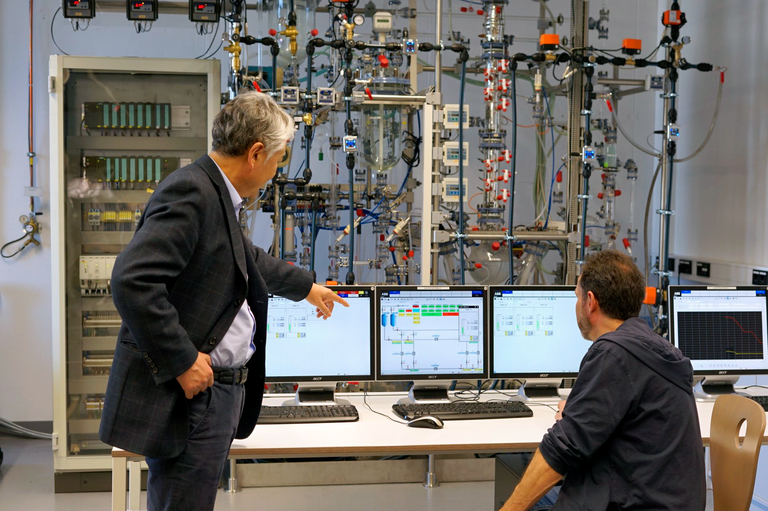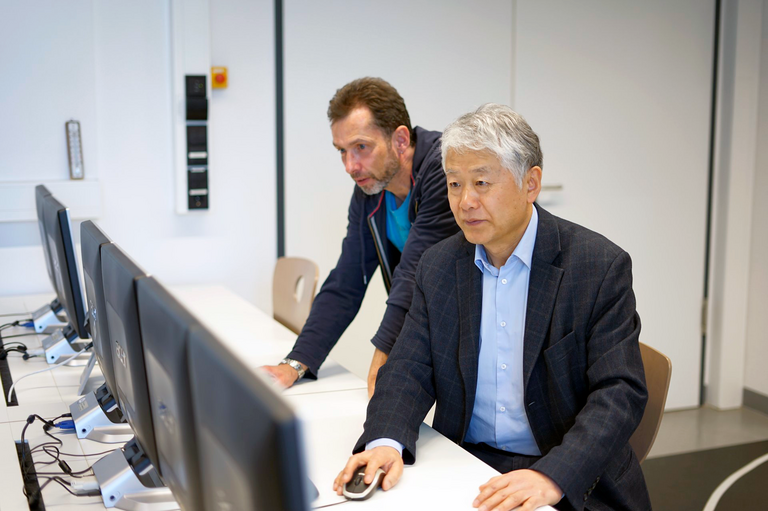Water is one of the essential resources of all life. Ensuring that all people have access to clean drinking water and safeguarding its quality is not just a task for politicians. Scientists like Prof. Pu Li, head of the Process Optimization Group at the TU Ilmenau, also make an important contribution to our water supply with their research. On the occasion of World Water Day, Prof. Li reports on how he uses mathematical modeling and optimization not only to protect water from contamination, but also to reduce energy consumption in waterworks.
![[Translate to English:] [Translate to English:]](/unionline/fileadmin/_processed_/1/d/csm_Pu_Li_d52017dd4b.jpg)
Prof. Li, access to safe and affordable drinking water for all is one of the UN's 17 Sustainable Development Goals. How does your research contribute to achieving this goal?
With research at our department, we use mathematical modeling and optimization to, for example, minimize water loss in water supply, improve water quality, and reduce water supply energy consumption and associated costs. In various research projects, we collaborate with university research partners as well as partners from industry. In real laboratories, our research results are then tested in application.
To ensure a clean drinking water supply, you resort to mathematical optimization or process optimization. How do you go about this?
It is not enough to carry out individual spot checks to determine water quality. You have to examine the entire water distribution system. We describe this with the help of mathematics, i.e. we map it with formulas and regularities - in other words, we model it. In this way, we can optimize the supply network in many places, e.g., we can better determine where valves should be installed to reduce the water pressure or at which points the pipes need to be flushed with fresh water. So the optimization methodology improves water quality and management.
Your research has a practical connection. For example, your department is cooperating with the "African Institute for Mathematical Sciences" (AIMS) in Rwanda to develop solutions for the water supply there using mathematical optimization approaches.
The project is designed to run for five years and is funded by the DAAD and the BMBF. We maintain a close exchange. Through regular project meetings in Kigali and Ilmenau we deepen our cooperation. Three doctoral students and one post-doc from AIMS Rwanda are currently conducting research at TU Ilmenau. They are to learn about our research on optimization methods and further develop it in practice in Rwanda.
Why is access to clean drinking water so difficult in this country?
Ensuring water quality is a problem in Rwanda. You are not allowed to drink water from the tap there, so during our visit last year we only drank packaged water from bottles - because the water treatment process is complex and expensive: drinking water is taken from a reservoir or from groundwater. Through a very delicate process, this must be treated until it is safe to drink. This process does not work as well in Rwanda as it does in Germany. The pipelines also have deficiencies. So there is still a lot to do. Our work starts with investigating the water supply. First, we have to identify problems and then find solutions to help the local people.
In your cooperation, you are also looking at agricultural production. How is this to be made more sustainable?
Farmers in Rwanda have to transport their goods to market by bicycle, which is a laborious process. We want to help them improve their supply chain management and make it more efficient. There are hardly any adequate warehouses there that can keep potatoes fresh for a long time, for example - also because they require appropriate cooling, which consumes a lot of energy. One approach to saving resources is to install a solar system on the roof of the storage buildings. How these systems can be optimally designed is another question we are addressing in our research and collaboration.
Currently, your field is part of several exciting research projects related to water supply, including "MoDiCon," which is funded by the German Federal Ministry of Education and Research. The aim is to use an online system to monitor water quality in an automated way.
In the joint project, we are working together with the Technion Israel Institute of Technology, the Technical University of Hamburg Harburg as well as the waterworks "Hamburg Wasser" and bbe Moldaenke GmbH, a manufacturer of environmental technology products. The goal is real-time monitoring of drinking water. Factors such as the concentration of pollutants in the water or the dwell time of the water in the pipeline system determine the degree of contamination. Sensors installed along the entire pipeline network immediately report when such contamination is measured, and where exactly. With the know-how of our field, we calculate appropriate measures and can react immediately. Typically, the network segment is then quickly isolated, flushed and the stagnant water pumped out so that the contamination remains localized and does not spread throughout the entire network. In the unaffected network segments, this does not endanger the drinking water supply.
In a DFG project, "Optimal pressure and water residence time management in water supply systems," you are working on water distribution systems. What is the aim of this project?
We want to reduce energy consumption and thus costs in waterworks. We want to achieve this by minimizing water loss. In Germany, we have about 10 percent loss, in developing countries even 30 percent. The aim of the project is to reduce the operating pressure so that the water flows more slowly overall, thus reducing water loss. To this end, we are installing pressure-reducing valves in the water distribution networks. One challenge here is to optimally calculate the positions where the valves are to be installed so that the greatest possible benefit is achieved. We want to reduce water loss to only five percent, for example. At the same time, the water retention time, i.e., how long the water remains in the pipe,should be minimized so that the water quality is improved.
Personal details:
Prof. Pu Li has been head of the Process Optimization department at Ilmenau Technical University since 2005. In his research, Prof. Li deals with mathematical modeling and optimization - related to various applications such as autonomous driving, energy systems engineering, water management, and systems biology. The scientist received his PhD from the TU Berlin, where his research focused on process engineering.



